With some help from our Clean Energy Home Loan, Bank Australia customers Annabelle and Alex gave their suburban 1930s Melbourne house the ‘net zero’ makeover. Here’s how they did it.
From the street, Annabelle and Alex's house in Melbourne’s inner north looks like your typical 1930s brick suburban single storey: draughty in winter, boiling in summer, surrounded by scrub grass and entirely unremarkable. The couple, both in their mid 30s, bought the place in February 2020, moving in during Melbourne’s first COVID lockdown.
The property might look ordinary, but it’s actually the latest in a high-tech ‘net zero home’ movement, which means Alex and Annabelle’s house now produces more energy than it consumes.
“The previous owners were sustainably minded,” says Annabelle, who works as a doctor, “there was double glazing and some solar panels on the roof. They’d installed gas appliances because, back then, that was the environmentally friendly option: it was better than coal.”

Alex and Annabelle thought they could go one step further, and began the process of improving the insulation, plugging up the old louvres in the bathroom (“A big hole in the wall, right next to the double glazing!”) swapping out all the gas appliances, and upgrading the existing solar panels. A Clean Energy Home Loan from Bank Australia made the whole process stack up well for Annabelle and Alex.
“We already had the mortgage from Bank Australia,” Alex says, “We calculated that, with the additional interest rate reduction from the Clean Energy Loan, we’d save $14,000 over five years. So we were like, okay, our budget is $14,000. If we spend that on upgrades, we’ll save that much in mortgage repayments, let alone the reduced bills and running costs.”
The couple began by doing their research. There was a lot of conflicting information online, particularly from companies spruiking their eco credentials, but luckily Alex and Annabelle discovered My Energy Efficient Home on Facebook – a public group where users swap ‘net zero’ tips and advice. “There’s a lot of knowledge from experts on there,” Annabelle says, “and we got a professional energy assessment, too. So we had the audit to guide us.”
The first step was insulation, which involved Alex crawling around in the roof and under the house, installing environmentally friendly batts. Next were the old lights: the couple replaced their pendant lights with modern LEDs, which were cheaper to run and wouldn’t overheat.
Then came the big-ticket items: a new solar network for the roof (which, after government rebates and an interest-free loan, cost around $1000 out-of-pocket) and a top-of-the-range $4000 electric hot water pump.
When Alex and Annabelle realised they were now exporting more energy than they were using, it made sense to install a TESLA battery (to store the surplus power). And with a battery, they could now charge an electric car.
“I almost felt obliged to keep going,” Annabelle says. “Every time we drove past a petrol station, I thought, I’m buying 50 litres of petrol to set on fire, just to move my ass around. It made me feel sick. So we got a second-hand Nissan Leaf from Japan. We just run a big extension cord down the side of the house to charge it. Now we have no electricity bills, no gas bills and no petrol bills.”

The couple says their quality of life has improved dramatically since the upgrades. The house stays cosy in winter and cool in summer. With proper insulation underfoot, the floors now feel more solid. And instead of sky-high electricity costs, the solar panels mean they actually make money from the grid in summer.
“When have you ever bought anything that you expected to pay you back?” Annabelle laughs. “Nothing else pays you back. But solar and energy savings do; it’s like printing money.”
“The whole process was much easier and streamlined than I expected,” Alex adds. “And it’s a cool feeling to be fully powered by the sun. This isn’t some fancy, multi-million dollar home, either. It’s just a normal, lovely house. Anyone can do this, and Bank Australia basically pays you for it!”
Want to go ‘net zero’ in your own home? Learn more.








